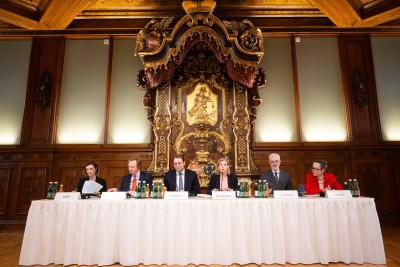At a time of growing international tensions and geopolitical upheaval, Foreign Minister Beate Meinl-Reisinger spoke clearly at the inaugural meeting of the Council for Austrian Integration and Foreign Policy (RIA). Her remarks focused on the need for increased international cooperation and a rules-based order as the central basis for security, prosperity, and sustainability – not only for Austria but for the international community as a whole.
“Our world is in upheaval, our security environment is completely different – at least since the Russian attack on Ukraine,” emphasized the Foreign Minister in her speech. “Especially in times like these, we have to ask ourselves: What protects us? What guarantees our security, our prosperity, our future? The answer is clear: maximum participation in EU foreign, security, and defense policy and, of course, a rules-based international order. An order in which not the law of the jungle applies, but the strength of the law.”
The meeting took place in the magnificent surroundings of a historic hall in the Foreign Ministry – flanked by high wooden walls with baroque gold decorations. Meinl-Reisinger, who presented herself as the keynote speaker, chaired a committee of 32 members made up of representatives from the Foreign Ministry, the Federal Chancellery, the Vice-Chancellery, the Ministry of Defense, the Parliament as well as the federal states, social partners and municipal levels.
Diplomacy as the first line of defense
The Foreign Minister emphasized the role of her department not only as a diplomatic hub but also as a central security policy player: “The Foreign Ministry is not just a diplomatic institution, it is a security department. Diplomacy is our first line of defense, as it prevents conflicts before they escalate. International cooperation protects us all – be it in the fight against terrorism, in cyber security, or the protection of Austrians abroad.”
These words exemplify the new foreign policy line that Meinl-Reisinger has been pursuing since taking office: Austria should act as a bridge builder between East and West, between North and South, and position itself more strongly in international decision-making processes.
Vienna as a UN location: economic factor and strategic asset
The Minister also emphasized Vienna’s economic and political importance as an international location. The presence of the United Nations in the city secures almost 20,000 jobs – from highly qualified specialist staff and security services to logistics and gastronomy. The annual value added by international organizations amounts to around 1.7 billion euros. Location policy is therefore not only a question of external impact but also of domestic political responsibility.
Austria is running for a seat on the UN Security Council
A central element of the speech was Austria’s candidacy for a non-permanent seat on the UN Security Council for the period 2027/2028. Meinl-Reisinger had already launched the official campaign in New York in March, as Vindobona.org reported. In her speech at the United Nations headquarters, she emphasized Austria’s values and contributions to the multilateral world order and called for broad international support. “For countries the size of Austria, it would be particularly dangerous if the law of the strongest were to prevail over the security of the law at the international level,” said the Foreign Minister in New York.
Youth and innovation as guidelines
Meinl-Reisinger also paid particular attention to the involvement of young people in foreign policy processes. Innovation and new ideas should be given greater consideration in Austrian diplomacy in the future. The UN candidacy offers a suitable framework for opening up international perspectives for young talents – for example through new exchange programs, internships, and Austrian contributions to the multilateral promotion of young talent.
Multilateralism in practice – a response to new threats
Austria’s new foreign policy aims to proactively address the challenges of our time. These include not only traditional security issues but also new forms of threat: cyber attacks, disinformation, migration, and climate change. According to Meinl-Reisinger, all of these challenges can only be met with cooperation, not isolation.
“Only an active, multilateral foreign policy enables Austria to shape the international security architecture. If we don’t help shape it, we will be shaped,” said Meinl-Reisinger. With this clear positioning, Austria is reaffirming its role as a committed
